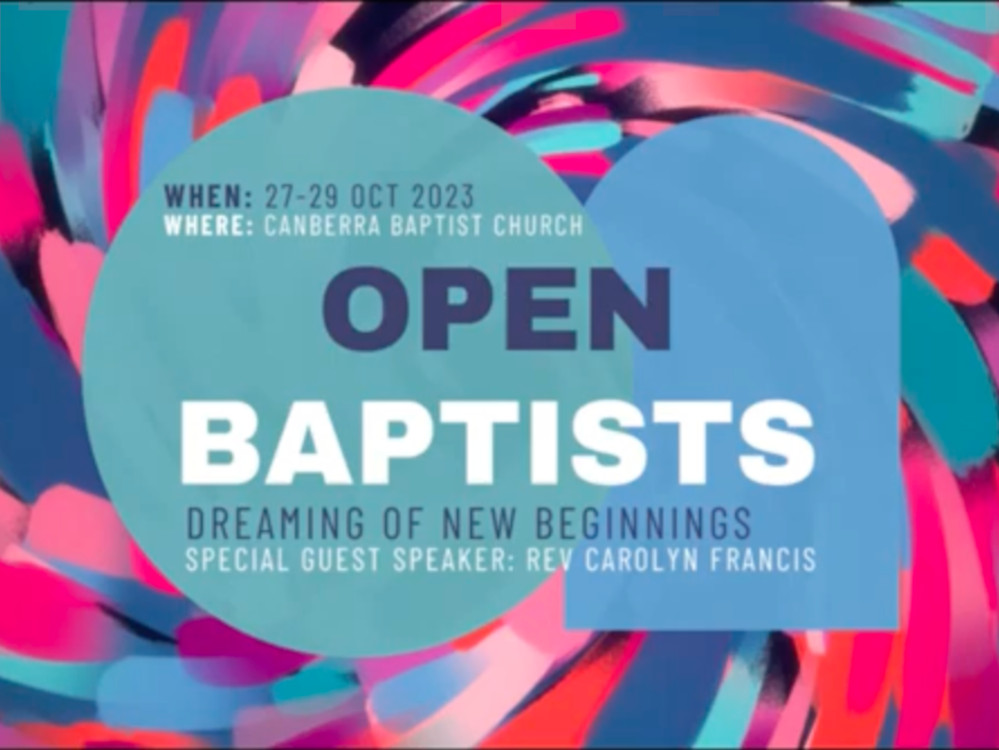A new association of Baptist churches, the Open Baptists , officially formed last weekend in Canberra as a body opposed to moves by the NSW/ACT Baptist Association to require pastors and churches to subscribe to a “position statement” that describes marriage as between a man and a woman.
“In view of the impending split in the NSW & ACT Association and holding grief in our hearts that it now seems unavoidable, those coming together to form the Open Baptists Association do so with the conviction that God can and will bring about something new and good through the new Association,” a statement given to The Other Cheek reads. “This was the very strong consensus of a group of Baptists from NSW, Victoria and ACT who met in Canberra on the last weekend in October to explore our hopes for what a new Baptist Association may be.”
The Open Baptists describe the NSW ACT Baptists policy as “excluding many people seeking to follow Christ in our churches.”
In response the NSW/ACT Baptists told the Other Check they are “in ongoing conversations with representatives of the Open Baptists group. We do not have any further comment at this time.”
The NSW Baptists have a membership of 340 congregations and 43,000 “members of the Baptist family. In comparison the number of churches affected by the position statement is tiny. the Other check knows of three Baptist churches in NSW and the ACT that are publicly LGBTQIA affirming; Seaforth, Hamilton and Canberra Baptist.
However the Open Baptist conference attracted people from other NSW and ACT congregations, concerned about a second issue – whether or not a Baptist Association should have a policy that excludes churches.
The pending expulsions of churches was the trigger for the Open Baptists to meet, Nathan Nettleton, pastor of South Yarra Community Baptist Church, Open Baptist board member told the the conference. But he also named the other concerns.
“To name the elephant in the room if you like, concerns that the patterns of association practised in our existing state Baptist associations are becoming less distinctly Baptist have been at the heart of the conversations that have led us to this weekend, but the triggers for those concerns have been very different in different parts of the country,” he said.
“In Victoria it was the decidedly unsexy topic of constitutional reform with two rounds of changes to the union constitution, which have made us a more centrally controlled organisation. In NSW/ACT, It has been the much more headline grabbing move to impose doctrinal conformity about marriage on our churches and at pastors and to expel those who dissent. When the concerned groups on either side of the Murray River began talking to each other, we discovered that there was actually a significant overlap in our concerns.”
Commitments to their State Associations and the autonomy of the local church can create tensions for Baptists Nettleton acknowledged. “Back in 1997, the Victorian Baptist Union commissioned a task force which I was part of, to explore various questions about homosexuality and our churches. On the night that the assembly debated and approved its final report, one prominent pastor got to his feet to challenge one of its findings, the one that pointed out that since our congregations are autonomous and can appoint non-ordained pastors, our churches could appoint gay pastors if they wished. ‘We need to challenge that, we need to change that,’ he asserted. ‘We need to make sure that our churches cannot do that. Our then General Superintendent rose in reply and said, ‘Well, you can do that, but if you do, you’ll cease to be Baptist and the exit door is just over there, your call.'”
The NSW/ACT Association has taken the opposite call, prioritising a doctrinal stance over churches being able to set their own direction.
Acknowledging grief
“For many of you, I recognise that some of you experience a deep grief that this gathering has been rendered necessary, a profound sense of loss that the group of churches, the association of which you have been a part and which you have served in some cases for many decades, no longer welcomes you as it once did,” keynote speaker Carolyn Francis lecturer in Baptist identity and Christian history at Whitley College in Melbourne, told the gathering. “I acknowledge the sadness that is attached to that.”
Others in the room had moved in a pragmatic direction, or were energised by the birth of a new movement.
Reflecting on sociologist Anthony Giddens’ writing that how we identify in the world has become more dynamic, Francis spoke of the chosen nature of a Baptist identity. “Interestingly, it seems to me that Baptists perhaps as much or more than most have actually been aware of cognizant of the dynamism of identity for our entire history.
“After all, the conviction that a person ought to be baptised as an adult, as a believer rather than as an infant, proceeds from an awareness that the decision to profess faith in Christ is one made freely a chosen identity, not a static given.”
But Baptist identity is notorious “slippery, Francis said. Fighters for religious freedom, hellfire preaching, and narrow requirements for membership could all be found in Baptist history. :
“Dissent is at least in part the tradition for 400 years we’ve been trying to work it out. As those very loved traditional Baptist words say, there is still more light and truth to break forth from the word. It’s not done, it’s not finished. We’re not propping up something from the past. We are taking its riches and examples into our future.”

